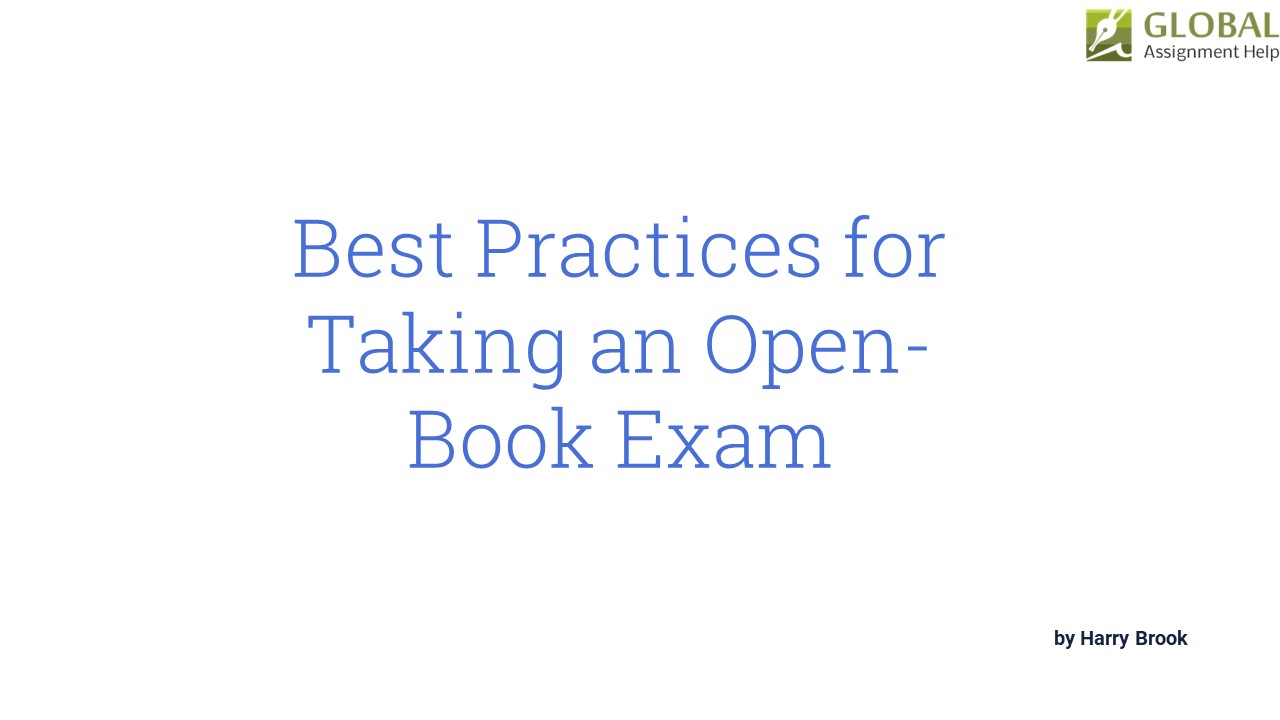Best Practices for Taking an Open Book Exam - PowerPoint PPT Presentation
Title:
Best Practices for Taking an Open Book Exam
Description:
Greetings from the open-book exam world! Discover helpful techniques to ace tests while efficiently using your study materials. – PowerPoint PPT presentation
Number of Views:2
Title: Best Practices for Taking an Open Book Exam
1
Best Practices for Taking an Open-Book Exam
by Harry Brook
2
Best Practices for Taking an Open-Book Exam
Welcome to the world of open-book exam! Learn
valuable strategies to ace your exams while
utilizing your study resources effectively.
HB
by Harry Brook
3
The Importance of Open-Book Exams
Open-book exams test your understanding of
concepts and your ability to apply knowledge in
real-world scenarios. They require critical
thinking and thorough preparation.
Enhance Understanding
Collaborative Learning
Adaptability and Problem-Solving
Open-book exams encourage students to grasp
concepts and analyze information, leading to a
deeper understanding of the subject matter.
Collaborating with peers during open-book exams
can facilitate knowledge-sharing and foster
teamwork, ultimately improving your overall
learning experience.
Open-book exams prepare you for real-life
situations where you may need to find and apply
information effectively to solve complex problems.
4
Preparation Strategies
Successful open-book exam preparation involves a
combination of effective study habits and
organization skills to optimize your performance
during the exam.
1
2
3
Understand the Exam Format
Create Comprehensive Study Notes
Practice Retrieval and Application
Familiarize yourself with the exam structure,
specific instructions, and the allowed reference
materials to plan your study approach accordingly.
Develop well-organized and concise study notes
that summarize key concepts, theories, and
relevant examples for quick reference during the
exam.
Engage in practice exams or quizzes to reinforce
your understanding and enhance your ability to
retrieve and apply information under time
constraints.
5
Effective Note-Taking During the Exam
Note-taking is a crucial skill during open-book
exams. Optimize your note-taking approach to
efficiently find and utilize information when
answering questions.
Create Clear Headings
Utilize Highlighting and Annotations
Develop Abbreviations and Symbols
Organize your notes using headings to quickly
locate relevant sections and prevent wasting time
searching for specific information.
Use highlighting and annotations to mark
important concepts, formulas, or examples, making
it easier to identify key information during the
exam.
Create a shorthand system of abbreviations and
symbols to condense information and increase the
speed of note retrieval while maintaining clarity.
6
Navigating the Reference Materials
Master the art of navigating your reference
materials efficiently, allowing you to locate
information quickly and accurately during an
open-book exam.
1
Know Your Resources
Familiarize yourself with the structure and
organization of the reference materials to easily
navigate through different chapters, sections,
and indexes.
2
Practice Scanning Techniques
Develop scanning techniques such as skimming,
scanning headings, and utilizing the index to
spot relevant information swiftly.
3
Create Bookmarks or Tabs
Use bookmarks or tabs to mark important sections,
pages, or formulas, enabling you to locate them
promptly without wasting valuable time.
7
Time Management Techniques
Effectively managing your time ensures that you
can complete the exam within the given timeframe,
maximizing your potential for success.
Plan Your Time
Prioritize Questions
Stay Focused and Avoid Distractions
Create a rough timeline allocating specific time
slots for each question or section, ensuring that
you complete the exam within the allocated time.
Start with easier questions to build momentum and
gain confidence before tackling more challenging
or time-consuming questions.
Minimize distractions such as notifications,
irrelevant reference materials, or unrelated
websites to maintain focus and save time during
the exam.
8
Utilizing Critical Thinking Skills
Open-book exams require more than just
memorization. Develop critical thinking skills to
analyze information and provide thoughtful and
well-supported answers.
1
2
3
Evaluate Multiple Perspectives
Critically Assess Information
Offer Well-Reasoned Explanations
Consider different viewpoints, theories, or
approaches relevant to the question to
demonstrate a comprehensive understanding of the
topic.
Assess the quality, reliability, and relevance of
the sources you are using to support your
answers, highlighting your ability to think
critically.
Provide logical and coherent explanations,
supported by evidence and examples, to showcase
your ability to analyze and interpret information
effectively.
9
Tips for Answering and Structuring Answers
Constructing clear and well-structured answers is
essential to communicate your understanding
effectively and maximize your chances of earning
full marks.
1
Read the Question Carefully
Thoroughly understand the question requirements,
including any specific instructions or
sub-questions, before crafting your response.
2
Create an Outline
Before writing your answer, develop a brief
outline to organize your thoughts and ensure a
coherent and logical flow of ideas.
3
Provide Concise and Clear Responses
Avoid unnecessary verbosity and ensure your
answers are clear, concise, and directly address
the question to maximize your chances of earning
full marks.































